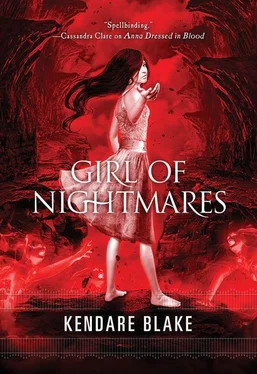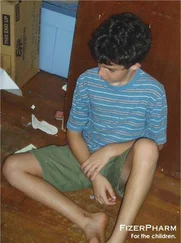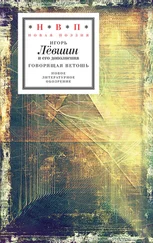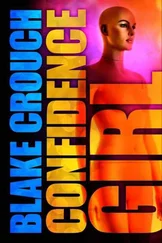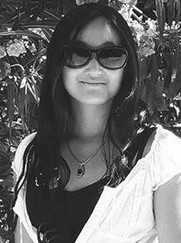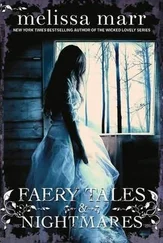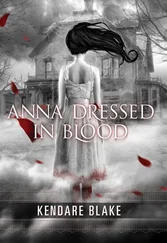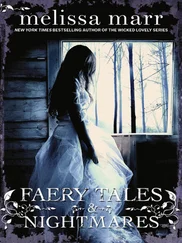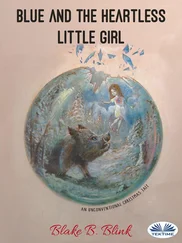“It isn’t any warmer in here than it is outside,” Thomas comments. He shuts his flashlight off too, finally. There’s a rustle of commotion overhead, and he jumps a mile, does the quick-draw on his flashlight, and points the beam at the ceiling.
“Sounds like pigeons,” I say. “Good thing. If we’re stuck out here too long we might have to do some yard-bird rotisserie.”
“That’s … disgusting,” says Carmel.
“It’s low-rent chicken. Let’s check it out.” There’s a rickety, rotting ladder that leads up to a trapdoor. I assume that all we’ll find is a hayloft and a bunch of roosting pigeons and sparrows. But I don’t need to tell Thomas and Carmel to be alert. They stay right behind, in constant contact. When Carmel’s toe strikes the tines of a pitchfork, half-buried in the hay, she makes a face. We look at each other and she shakes her head. It can’t be the same one, the same pitchfork that the farmer’s wife fell on. That’s what we say to ourselves, though I guess there’s no real reason it can’t be.
I go up into the hayloft first. A sweep of my flashlight shows a large, flat expanse of hay-covered floor, and a few tall stacks of bales along the south wall. When I cast my light up toward the slanted roof, I see what has to be close to fifty pigeons, none of whom appear to mind the disturbance.
“Come on up,” I say. Thomas climbs up next and we both help Carmel. “Watch it; this hay is loaded with bird shit.”
“Nice,” she mutters.
Once we’re all up, we look around, but there isn’t a whole lot to see. It’s just a vast, open space, lined with hay and bird turds. There’s a pulley system they must’ve used to move hay suspended from the ceiling, and thick ropes are looped over the rafters.
“You know what I hate about flashlights?” Thomas asks, and I watch his beam move around the room, revealing sudden bird faces and shifting wings, then nothing but cobweb-covered boards. “They always make you think about the stuff that you’re not seeing. The stuff that’s still in the dark.”
“It’s true,” says Carmel. “That’s the worst shot in a horror movie. When the flashlight finally finds whatever it was looking for, and you realize that you’d rather not know what it looks like.”
They should both shut up. Now is not the time for them to be trying to freak themselves out. I walk off a little way, to hopefully put an end to the conversation and also to test out the quality of the floor. Thomas walks a little in the other direction, staying close to the wall. My flashlight moves over the hay bales, paying close attention to places something might hide. I don’t notice anything except how gross they look speckled with brown and white. Behind me, there’s a long creaking sound, and when I turn a rush of wind hits my face. Thomas found one of the hay doors and opened it up.
The feeling of being watched is gone. We’re just three kids, in an abandoned barn, pretending to be stranded for the benefit of no one. Maybe this wasn’t even the right place to begin with, and the feeling I got walking through the door was a fluke.
“I don’t think that rune of yours is working too well,” I say. Thomas shrugs. His hand drifts absently to his pocket, where the runestone weighs on the fabric.
“It was never a sure thing. I don’t work with runes very often. And I’ve never carved one myself before.” He bends down and looks through the hay door, out into the night. It’s gotten colder; his breath is a foggy cloud. “Maybe it doesn’t matter anyway. I mean, if this is the place, how many people are really in danger? Who comes out here? The ghost of whoever it was probably got bored and went to fake accidental deaths somewhere else.”
Accidental deaths. The words scratch at the surface of my brain.
I’m an idiot.
A rope falls from the rafter. I turn to yell at Thomas but the words don’t come out fast enough. All I get out is his name, and I’m running, sprinting toward him because the rope is falling, and the ghost attached to the end of it becomes corporeal half a second before it shoves Thomas through the hay door, headfirst to a forty-foot drop to the cold, hard ground.
I dive. Hay needles into my jacket, slowing me down, but I’m not thinking of anything besides that glimpse of Thomas, and when I vault myself through the hay door I manage to catch hold of his foot. It takes every ounce of strength in my knuckles to hold on to him as he bangs into the side of the barn. In the next moment, Carmel’s there with me, hanging half out of the door too.
“Thomas!” she shouts. “Cas, pull him up!” With each of us holding a foot we jerk him back inside, first to the toes, then to the knees. Thomas is handling all this very well, not screaming or anything. We’ve almost got him back up when Carmel screams. I don’t need to look to know it’s the ghost. There’s an icy pressure against my back and all of a sudden the air smells like the inside of a meat locker.
I turn and he’s right in my face: a young guy in faded overalls and a short-sleeved chambray shirt. He’s fat, with a gut paunch and arms like pale, overstuffed sausages. There’s something wrong with the shape of his head.
I’ve got the knife out. It flashes from my back pocket, ready to go straight into his belly, when she laughs.
She laughs. That laugh that I know so well even though I heard it only a handful of times. It’s coming out of this fat hillbilly’s gaping mouth. The athame almost falls out of my hand. Then the laugh cuts out, abruptly, and the ghost backs off and roars, something that sounds like English played backward though a bullhorn. Overhead, the fifty or so pigeons erupt off of their roosts and flap down toward us.
In the middle of feathers and musty bird smell, I shout at Carmel to keep pulling, to not let Thomas fall, but I know she won’t, even though tiny beaks and claws are getting caught in her hair. As soon as we have Thomas back inside I shove them both toward the ladder.
Our feet tramp down in a panic of flapping wings. I have to remind myself to look back, to make sure the bastard isn’t going to try another push.
“Where are we going?” Carmel shouts, disoriented.
“Just get out the door,” Thomas and I shout back. By the time my feet hit the bottom rung of the ladder, Carmel and Thomas are way ahead, running. I sense the ghost materialize to our right, and turn. Now that I have a closer look, I can see that what’s wrong with the shape of his head is that the back of it is caved in. I can also see that he’s holding the pitchfork.
Just before he throws it, I shout something at Carmel. It must be the right thing, because she whirls to see what it is and jerks her body to the left just before the tines of the pitchfork impale the wall. She finally starts screaming and the sound sharpens me; I draw my arm back and throw the athame in a snapping motion. It flies through the air and finds its home in the farmer’s gut. For an instant, he looks my way, at me and right through me, with eyes like tepid pools of water. I don’t feel anything this time. I don’t wonder where the knife is sending him. I don’t wonder whether the Obeahman can still feel it. When he wavers right out of existence like a ripple of heat, I’m just glad he’s gone. He almost killed my friends. Fuck that guy.
The athame hits the ground with a soft thud and I run to pick it up before going to Carmel, who is still screaming.
“Carmel! Are you hurt? Did it get you?” Thomas asks. He inspects her as she whips her head back and forth in a panic. The pitchfork came just that close. So close that one of the tines stabbed through the shoulder of her coat and pinned her to the wall. I reach up and yank the pitchfork loose, and she jumps away, brushing at her coat like it’s dirty. She’s equal parts scared and pissed off, and when she screams, “You stupid asshole!” I can’t help but feel like she’s screaming at me.
Читать дальше
